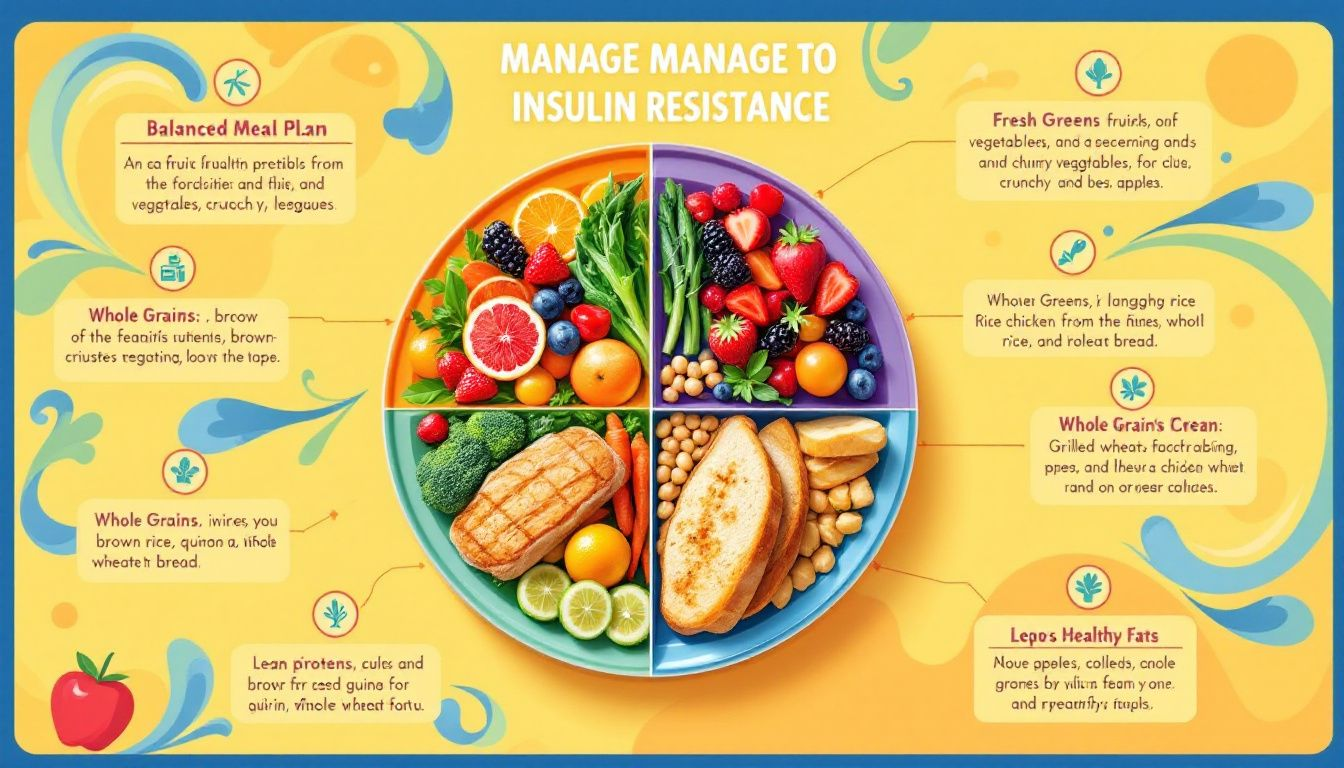Insulin resistance is a growing health challenge, affecting nearly 40% of U.S. adults. This condition, marked by the body’s diminished response to the hormone insulin, can lead to elevated blood glucose levels, metabolic syndrome, and an increased risk of developing diabetes mellitus. While insulin resistance is influenced by factors like excess weight, inactivity, and genetics, there’s good news: lifestyle changes and carefully chosen dietary supplements can significantly improve insulin sensitivity. But with so many options available, how do you determine the best supplement for insulin resistance?
In this article, we’ll explore the most promising supplements, including Vitamin C, Chromium, and Probiotics, which have been shown to support glucose metabolism, improve glycemic control, and reduce blood sugar levels. Whether you’re managing type 2 diabetes, polycystic ovary syndrome, or gestational diabetes or aiming to reverse insulin resistance, these strategies can play a key role in your journey to better health. With insights into key supplements, lifestyle adjustments, and why consulting a healthcare professional is essential, this guide will empower you to take control of your metabolic health.
Key Takeaways
- Insulin resistance affects about 40% of U.S. adults and is influenced by factors such as obesity, inactivity, and genetics.
- Several supplements, including Vitamin C, Chromium, and Probiotics, can help improve insulin sensitivity and manage blood sugar levels.
- Consulting a healthcare professional before starting supplements is crucial to ensure safety and effectiveness while combining them with healthy lifestyle changes.
Understanding Insulin Resistance

Insulin resistance occurs when the body doesn’t respond effectively to insulin, the hormone that regulates blood sugar levels. This condition hampers glucose metabolism, leading to elevated blood glucose levels. It’s alarmingly prevalent, affecting approximately 40% of U.S. adults who are insulin resistant. Grasping this condition is key to managing it successfully.
Insulin plays a vital role in our bodies. It allows glucose to enter cells, where it’s used for energy. When the hormone insulin isn’t working properly, the body needs more insulin to manage blood glucose, leading to excess insulin production. If left unchecked, insulin resistance can progress to more severe health issues like type 2 diabetes.
Managing insulin levels is vital for maintaining a healthy weight and overall health in those with insulin resistance. Knowing how insulin functions in our bodies helps manage and reduce insulin resistance.
Causes and Symptoms of Insulin Resistance
Before:
Several factors contribute to the development of insulin resistance, with obesity, inactivity, and genetic predisposition being the most significant. Excessive weight, particularly around the abdomen, is closely linked to higher insulin resistance rates. A sedentary lifestyle can further exacerbate this, where lack of physical activity hinders the body’s ability to respond to insulin. Genetics significantly influence insulin resistance. A family history of diabetes or metabolic syndrome increases your risk. Recognizing these factors can help in taking proactive steps to manage insulin resistance.
After:
Several factors contribute to the development of insulin resistance:
- Obesity, particularly excessive weight around the abdomen, is closely linked to higher insulin resistance rates.
- Inactivity, where lack of physical activity hinders the body’s ability to respond to insulin, can further exacerbate the condition.
- Genetic predisposition plays a significant role; a family history of diabetes or metabolic syndrome increases your risk of liver insulin resistance.
Recognizing these risk factors can help in taking proactive steps to manage insulin resistance.
Common symptoms of insulin resistance are fatigue, increased hunger, and elevated blood sugar levels. These symptoms, while common, can be easily overlooked or attributed to other issues. Pay attention to these signs and consult a doctor if you suspect insulin resistance. Early detection and management can prevent the condition from progressing to type 2 diabetes.
Top Supplements for Insulin Resistance

Dietary supplements can significantly aid in managing insulin resistance. Supplements improve insulin sensitivity, regulate blood sugar, and support metabolic health. This section will explore the top supplements known for their beneficial effects on insulin resistance.
From vitamins to minerals, each supplement offers unique benefits. Whether enhancing insulin production or aiding glucose metabolism, incorporating these supplements into your daily routine can significantly impact your health. Let’s explore some of the best options available.
Vitamin C
Vitamin C is a potent antioxidant that supports insulin sensitivity and production. Enhancing insulin’s effectiveness aids in better blood sugar management. Regular Vitamin C intake can improve insulin production, easing blood glucose control. Incorporating Vitamin C into your diet through fruits, vegetables, or supplements can provide these benefits. This simple method boosts metabolic health and helps manage insulin resistance.
If you’re considering adding a Vitamin C supplement to your routine, Your Guide to the Best Supplement for Vitamin C: Making Sense of Your Options is a must-read. This article reviews five of the top Vitamin C supplements available on Amazon, offering valuable insights into their benefits and formulations. It’s a time-saving resource to help you choose the best option for your needs while supporting your metabolic health.
Chromium
Chromium is essential for glucose metabolism and enhancing insulin sensitivity. Supplementing with chromium, particularly at a dosage of 400 micrograms daily, has shown promising results in managing insulin resistance. This mineral enhances the action of insulin, making it easier for cells to absorb glucose.
Consistent chromium supplementation significantly aids blood sugar control and overall health.
Probiotics
Probiotics, beneficial bacteria, support gut health and help manage insulin resistance. Specific strains, such as Bifidobacterium and Lactobacillus, have been shown to decrease fasting blood glucose levels and improve insulin sensitivity. Probiotic supplementation can also reduce hemoglobin A1c levels, a marker of long-term blood sugar control, by an average of 0.81%. Integrating probiotics through supplements or fermented foods provides significant benefits for metabolic health.
For those looking to add probiotics to their routine, Want to Drop a Few Pounds? Here are Five Top Rated Probiotics for Weight Loss is an excellent resource. This article reviews five of the top-ranked probiotics, which not only aid in weight control but also contribute to managing insulin resistance. It’s a valuable guide to help you select high-quality probiotics tailored to support your health goals.
Inositol
Inositol is particularly effective in enhancing insulin sensitivity and improving cellular glucose uptake. It is beneficial for conditions such as polycystic ovary syndrome, diabetes, and metabolic syndrome, making it a versatile supplement for managing insulin resistance.
Inositol usage improves blood sugar control and overall metabolic health. Inositol is a valuable addition to regimens targeting insulin resistance reduction.
Folic Acid
Folic acid is renowned for improving glycemic control and managing insulin resistance. Supplementation has been associated with a significant decrease in A1c levels, making it an effective option for those with diabetes.
The recommended dose for supporting diabetic neuropathy is 1 mg once daily. Adding folic acid to your diet aids in better blood sugar management and overall health.
Zinc
Zinc supports glucose metabolism and insulin production and secretion. Supplementing with zinc, at an average of 35 milligrams daily, can help manage blood glucose and improve insulin sensitivity. People with diabetes often have lower zinc serum levels, highlighting the importance of adequate intake. Eating zinc-rich foods like beef, oysters, and fortified cereals helps maintain proper levels.
For those considering supplementation, The Health Enthusiast's Dream: Five Of The Best Zinc Selenium Supplements You Need to Know is a great starting point. This review introduces five top Zinc/Selenium supplements, offering insights into their benefits and helping readers choose high-quality options to support insulin sensitivity and overall metabolic health.
Potassium
Potassium is crucial for supporting insulin sensitivity and managing diabetes risk. Adequate potassium intake is crucial for maintaining proper insulin function and lowering the risk of developing diabetes. Adding potassium-rich foods like bananas, spinach, and sweet potatoes to your diet enhances metabolic health and supports insulin resistance management.
L-Carnitine
L-carnitine, an amino acid-derived supplement, helps reduce insulin resistance. Daily intake, ranging from 0.25 to 4 grams, has been shown to lower blood sugar levels, including fasting blood sugar and HbA1c, and alpha lipoic acid may also contribute to these effects.
This supplement supports lipid metabolism, making it beneficial for weight management and overall metabolic health. Adding L-carnitine to your regimen can greatly enhance insulin sensitivity and blood sugar control.
Can Supplements Improve Insulin Sensitivity?

Studies indicate that dietary supplements assist in managing insulin resistance. They may also lower the risk of developing prediabetes and type 2 diabetes. However, the quality of evidence supporting their effectiveness varies.
Chromium and zinc supplements, for instance, have shown benefits in improving glycemic control and insulin sensitivity. L-carnitine also enhances insulin sensitivity and lowers fasting blood sugar levels.
Supplements should enhance, not replace, lifestyle changes. Combining supplements with a balanced diet, regular exercise, and stress management is crucial for managing insulin resistance effectively.
Considerations Before Taking Supplements

Consulting a healthcare professional before starting new dietary supplements ensures safety and effectiveness. Effective management of insulin resistance requires personalized advice from a healthcare provider.
The FDA warns against products claiming to be a ‘natural cure’ for diabetes, as they may be illegal and harmful. Some dietary supplements could have serious side effects, including kidney damage.
Consult a healthcare provider before starting new supplements to avoid potential interactions with medications and individual health conditions. This step ensures that the supplements you choose are safe and effective for your specific needs.
Additional Strategies to Support Insulin Resistance Management

Addressing insulin resistance requires a multifaceted approach that combines dietary supplements with essential lifestyle changes. The global rise in obesity is a key factor in the increasing prevalence of insulin resistance, as excess weight, particularly around the abdomen, can lead to liver insulin resistance and chronic inflammation. Adopting a healthy diet and maintaining a healthy weight are critical to combat this. Research shows that even a modest weight loss of around 5-10% can significantly improve insulin sensitivity, fasting blood glucose levels, and glycemic control.
Dietary changes play a pivotal role in managing insulin resistance. Incorporating whole grains, legumes, and other high-fiber foods while minimizing refined carbohydrates and highly processed foods can help stabilize blood glucose levels and reduce the need for excess insulin production. A vegetarian or plant-based diet, rich in antioxidants and healthy fats, improves glucose metabolism and reduces high blood sugar levels. Additionally, avoiding sugar-sweetened drinks and eating foods that support lipid metabolism, such as those rich in omega-3 fatty acids, can further enhance cardiovascular health and reduce the risk factors associated with insulin resistance.
Physical activity is equally important in managing insulin resistance. Engaging in resistance training and aerobic exercise promotes skeletal muscle function, which is vital for improving insulin sensitivity and reducing fasting insulin levels. For individuals with metabolic syndrome or prediabetes, regular physical activity has been shown to lower the risk of developing diabetes and improve overall blood glucose levels.
Stress management and sufficient sleep are often overlooked but are essential in maintaining hormonal balance. Chronic stress can lead to excess insulin production, while inadequate sleep is linked to increased fasting blood sugar levels and weight gain, exacerbating insulin resistance. Developing habits that promote relaxation, such as mindfulness or yoga, and ensuring 7-8 hours of quality sleep per night can significantly impact managing insulin levels.
Combining these lifestyle adjustments with dietary supplements tailored to improve insulin sensitivity offers a comprehensive approach to reducing insulin resistance. Supplements such as alpha lipoic acid, chromium supplements, and zinc supplementation, paired with a healthy diet and regular physical activity, provide synergistic health benefits that support metabolic health and overall well-being.
In Summary
Managing insulin resistance requires a compassionate and holistic approach that integrates dietary supplements, healthy lifestyle changes, and professional medical advice. With the rising prevalence of metabolic syndrome and the global obesity epidemic, addressing risk factors like excess weight, poor diet, and inactivity is more critical than ever. Supplements such as Vitamin C, Chromium, Probiotics, and Zinc play a vital role in improving insulin sensitivity, supporting blood glucose control, and reducing fasting blood sugar levels. These supplements can complement other strategies, such as adopting a healthy diet, engaging in regular physical activity, and managing stress and sleep to enhance overall health.
This comprehensive approach to managing insulin resistance goes beyond simply lowering blood sugar levels. It emphasizes improving glucose metabolism, supporting lipid metabolism, and addressing conditions like liver insulin resistance, polycystic ovary syndrome, and gestational diabetes. Proactively incorporating whole grains, fiber-rich foods, and resistance training into daily routines helps promote a healthy weight, reduce chronic inflammation, and decrease the need for excess insulin production. These steps not only help to reverse insulin resistance but also reduce the risk of developing type 2 diabetes, cardiovascular disease, and other long-term complications.
In a world where many are searching for natural ways to support their health, integrating the best supplement for insulin resistance with sustainable lifestyle changes offers hope and tangible solutions. By taking these steps, you can regain control over your insulin levels, improve glycemic control, and pave the way to a healthier, more vibrant life. Remember, every small change—whether it’s adding a supplement, reducing refined carbohydrates, or engaging in regular physical activity—is a step toward a significant transformation.
Brief Answers to FAQs
How does Vitamin C help with insulin resistance?
Vitamin C supports insulin sensitivity and production, effectively managing blood sugar levels. This connection can be beneficial for those looking to improve their insulin resistance.
What is the recommended dosage of Chromium for improving insulin sensitivity?
The recommended dosage of Chromium for improving insulin sensitivity is 400 micrograms daily. Adhering to this dosage may help enhance your insulin response and overall metabolic health.
Which probiotic strains are beneficial for managing insulin resistance?
Bifidobacterium, Lactobacillus, Bacillus, Lactococcus, and Streptococcus are beneficial probiotic strains for managing insulin resistance. Incorporating these strains into your diet may help improve metabolic health.
What are the benefits of Inositol for insulin resistance?
Inositol significantly enhances insulin sensitivity and improves cellular glucose uptake, making it particularly beneficial for conditions such as PCOS and metabolic syndrome. This can lead to better regulation of blood sugar levels and overall metabolic health.
Should I consult a healthcare professional before taking new supplements?
Consulting a healthcare professional before taking new supplements is essential for ensuring safety, preventing potential medication interactions, and evaluating their effectiveness.
Thanks for taking this journey to explore the best supplement for Insulin Resistance. If you want to add to your library of knowledge and are interested in diving deeper into some of the supplements mentioned in this article, you should check out the links above. It could be a huge time-saver - you won't be sorry you took a look.
Also, please return soon to check out our next review of other incredible supplements – we’re always looking out for YOU!
*We are NOT qualified medical advisors. The content here is only based on our personal opinions and research and should NOT be used as a substitute for a healthcare professional's advice!











Member discussion